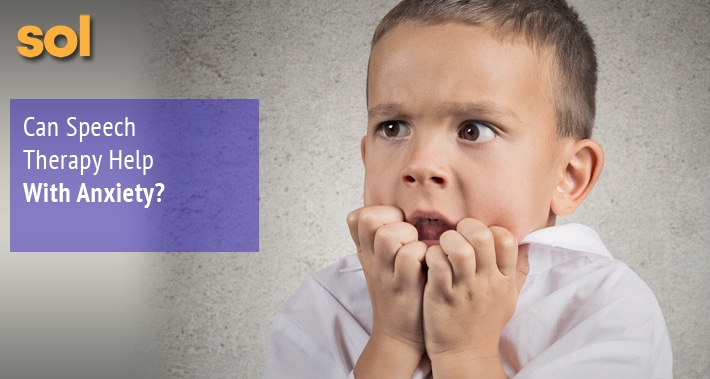
Is your child more nervous than their peers?
Does their nervousness make them stutter, or do they have trouble speaking out loud in certain social situations?
Did you know that there is a link between anxiety and speech and language disorders?
If you are finding out about the connection between anxiety and speech and language disorders for the first time, don’t be afraid.
It’s true that there’s an overlap between anxiety and speech disorders, but help is available.
Keep reading to learn more about the connection between anxiety and language disorders, and how speech and language therapy can help your child.
What Is Anxiety?
Anxiety is your body’s natural response to stress.
Anxiety is characterized as a feeling of fear or apprehension about what’s to come.
Certain events, such as the first day of school, meeting a new teacher, or being in a large group of new people might cause your child to feel nervous.
But if their feelings of anxiety are excessive or severe, last for longer than six months, and are interfering with their life, your child may have an anxiety disorder.
An anxiety disorder is when you feel this apprehension and nervousness all the time, even when there is no immediately obvious reason for it.
The anxiety disorder can be intense and prevent your child from doing things that they would otherwise be able to do.
This type of anxiety may cause them to stop doing things they enjoy.
If left untreated, the anxiety can worsen.
Speech And Language Disorders Linked With Anxiety
There are a number of speech and language disorders linked with anxiety.
You may have heard of some of them.
It’s important to note, however, that speech therapists do not treat anxiety directly.
That’s the realm of a mental health professional like a psychotherapist.
However, if your anxiety is linked with a speech or language disorder, speech therapy for adults can help alleviate that disorder.
Likewise with speech therapy for children.
However, it’s interesting to note that in some cases an anxiety disorder can hold somebody back from receiving the very treatment that can help alleviate it.
In that case, we can help as well.
We offer virtual speech therapy sessions as well, which can not only be more convenient, they can alleviate your anxiety as you go through the course of treatment in the comfort of your own home.
Without further ado, let’s take a look at speech disorders linked with anxiety below.

1. Dyslexia
Dyslexia is a speech and language disorder with a link to anxiety.
Dyslexia is characterized by a difficulty identifying words, understanding written and spoken language, and literacy problems.
It’s common for kids with dyslexia to experience anxiety.
Kids with dyslexia may feel anxious because they don’t understand why reading is so hard for them.
And reading-related anxiety can affect how kids feel about learning in general.
Kids with dyslexia might feel anxious about having to read “easier” books or being called on to read a passage in class and mispronouncing the words in front of everyone.
While dyslexia doesn’t lead to an anxiety disorder, the two conditions often co-occur.
If your child has both, it can help to know you’re not alone.
According to one study, nearly 30 percent of kids with dyslexia also have an anxiety disorder.
Be sure to monitor your child for symptoms of anxiety and dyslexia.
By reassuring them that their dyslexia doesn’t mean that they are unintelligent or lazy, and that they can succeed in life with dyslexia, you may be able to help lessen their anxiety about it.
Speech therapy for dyslexia can also help to build their language skills.
2. Stuttering
Stuttering is a complex speech issue.
People who stutter may become socially anxious, fear public speaking, or worry their stuttering will undermine their performance at work or school.
Research shows that stuttering is not a mental health diagnosis, and anxiety is not the root cause of stuttering.
Anxiety can, however, make stuttering worse.
Stuttering often presents in childhood.
Common among children ages 2-6 who are learning to speak, it sometimes goes away on its own.
Five to 10 percent of children stutter at some point, and at least 75% outgrow it.
For the remaining 25%, however, stuttering may continue to be a problem in adulthood.
Stuttering is often much worse when a child is anxious.
To support your child with their stutter, make sure that you create a relaxed environment around speech and communication.
Don’t talk over your child, correct their speech, or ask them to speak more quickly.
Attentively listen to your child while they speak.
Children who stutter may worry the person to whom they are speaking is annoyed or bored.
Don’t correct your child’s stutter or give them the word they appear to be looking for.
Speech therapy for stuttering can help them strengthen their speaking skills and build confidence at their own pace.
And if you notice they’re stuttering at a young age, seek early intervention speech therapy, as it’s been shown early treatment has much better results than taking the “wait and see” approach.
3. Selective Mutism
Selective mutism is an anxiety disorder that often emerges in childhood.
Selective mutism is diagnosed when a child consistently doesn’t speak in some situations but speaks comfortably in other situations.
These children are unable to speak in certain social situations where there is a demand to speak, such as at school, at dance class, at soccer practice, or at the corner store.
In other situations, these same children may speak openly with others and may even be considered to be chatty.
Selective mutism causes significant impairment in children’s lives and can interfere with performance at school and with friends.
It can often prevent them from having fun and engaging in regular childhood experiences.
It also can keep them from having their personal or school needs met, as they are unable to ask for help.
If you think your child has selective mutism, talk to a speech therapist.
They can give you tips for helping your child, as well as strategies to begin incorporating at home.
Book Your Appointment With Sol Speech And Language Therapy Today
If you’re ready to take the first steps towards alleviating your child’s anxiety and improving their speech and language skills, schedule your appointment at a clinic location today.
Our licensed speech pathologists have experience working with anxiety in relation to speech disorders.
During your appointment, you’ll have the chance to share your child’s medical history and discuss goals for your child’s speech and language development.
Following an evaluation, your speech therapist will design a treatment plan tailored for your child’s unique needs.
Book your appointment with Sol Speech And Language Therapy today.
6448 E Hwy 290 Suite E-108,
Austin, TX 78723
(512) 368-9488
» https://g.page/r/CfRfhOpEQm7BEAE
Sol Speech & Language Therapy
555 Round Rock W Dr E-221,
Round Rock, TX 78681
(512) 808-3953
» https://g.page/r/Cb5pwCTosSEfEBM
Sol Speech & Language Therapy offers personalized skilled intervention to those struggling with their speech and language skills. Services offered include screening, consultation, and comprehensive evaluation. We also provide one-on-one and/or group therapy for speech sound disorders, receptive/expressive language delay/disorder, stuttering/cluttering, accent reduction, and much more.